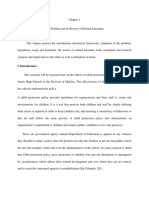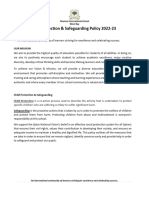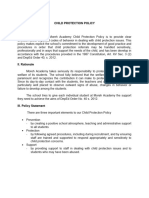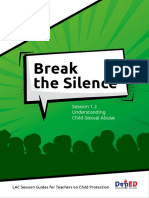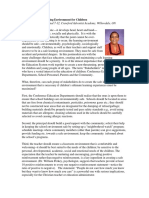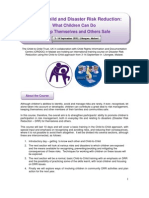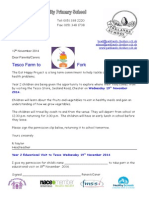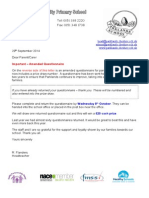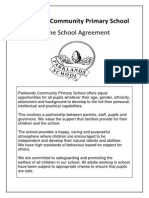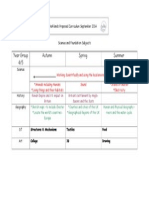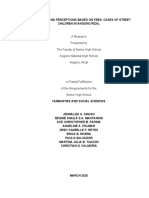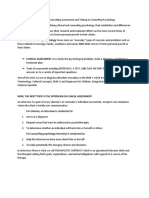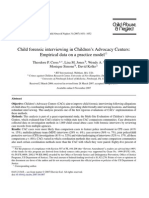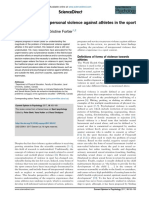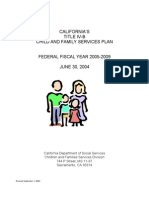Safeguarding Policy Feb 13
Safeguarding Policy Feb 13
Uploaded by
parkadminCopyright:
Available Formats
Safeguarding Policy Feb 13
Safeguarding Policy Feb 13
Uploaded by
parkadminCopyright
Available Formats
Share this document
Did you find this document useful?
Is this content inappropriate?
Copyright:
Available Formats
Safeguarding Policy Feb 13
Safeguarding Policy Feb 13
Uploaded by
parkadminCopyright:
Available Formats
PARKLANDS COMMUNITY PRIMARY SCHOOL
Safeguarding Policy
Date
Feb 13
Review
Date
Feb 14
Coordinator
Nominated Governor
R. Flanders
H. Gilfoyle
This policy is based on policy and procedure guidance from Cheshire West &
Chester Council.
Vision Statement
Parklands is:
a place where all children are safe
a place where every person is valued and respected
a place where resilience, aspiration and achievements are celebrated
a place where we encourage everyone to make healthy life choices
a place where everyone is encouraged to make a positive contribution
a place where everyone is encouraged to aim high
a place where we strive to support and co-operate with families to
develop the whole child
Mission Statement
Parklands school is a community where positive relationships between
parents, pupils and staff enable children to grow both in independence and
self confidence.
It is a place where all are equally valued and recognise the contribution they
can make to each others learning. In an atmosphere of encouragement, trust
and respect, and through as wide a variety of educational experiences as
possible, all pupils have the opportunity to develop their skills, talents and
intellect to the full.
PARKLANDS COMMUNITY PRIMARY SCHOOL
CONTENTS
Section
1 - Introduction
1.1 - School Commitment
1.2 - Duties
2 - School Responsibilities
2.1 - Role and Responsibilities of Senior and Deputy
Designated persons
2.1.1 - Referrals
2.1.2 - Raising Awareness
2.1.3 - Training
3 - Role and Responsibilities of Head Teacher
4 - Role and Responsibilities of Governing Body
5 - Identifying Concerns
6 - Confidentiality
7 - Records and Monitoring
8 - Supporting Children
9 - Early support
10 - Recruitment
11 - Volunteers
12 - Safe Staff
13 - Conduct of Staff
14 - Supporting Staff
15 - Photographing Children
16 - Before and After School Activities and Contracted
Services
PARKLANDS COMMUNITY PRIMARY SCHOOL
Links to other School Policies
Appendix
1
Introduction
What is the difference between Safeguarding and Child Protection?
Safeguarding and promoting the welfare of children is defined as:
protecting children from maltreatment
preventing impairment of childrens and learners health or development
ensuring children are growing up in circumstances consistent with the
provision of safe and effective care
Child Protection is a part of Safeguarding and promoting welfare. It refers to
the activity that is undertaken to protect specific children who are suffering, or
are likely to suffer, significant harm.
Effective child protection is essential as part of wider work to safeguard and
promote the welfare of children. However, all agencies and individuals should
aim to proactively safeguard and promote the welfare of children so that the
need for action to protect children from harm is reduced.
There are five main elements to our policy:
Ensuring we practise safe recruitment in checking the suitability of staff
and volunteers to work with children;
Raising awareness of safeguarding children and child protection
Equipping children with the skills needed to keep them safe;
Developing and implementing procedures for identifying and reporting
cases, or suspected cases of abuse;
Supporting pupils who have been abused in accordance with his/her child
protection plan;
Establishing a safe environment in which children can learn and develop.
1.1
School Commitment
The school is committed to creating and maintaining a safe learning
environment for children and young people, identifying where there are
child welfare concerns and taking action to address them, in
partnership with families and other agencies. This policy reflects the
policies of Cheshire West Local Safeguarding Childrens Board
http://www.cheshirewestlscb.org.uk/
and is in line with Working Together to Safeguard Children (2010)
http://www.workingtogetheronline.co.uk/
PARKLANDS COMMUNITY PRIMARY SCHOOL
The school will also contribute through the curriculum by developing childrens
understanding, awareness and promoting their resilience by providing a safe
environment within schools.
To create this safe environment the school has certain statutory duties and
responsibilities set out within:
The Education Act, 2002, HM Guidance;
Safeguarding Children and Safer Recruitment in Education, 2006;
Working Together to Safeguard Children, 2010
The Statutory Framework for the Early Years Foundation Stage
These duties are listed below:
1.2
Duties
To provide a safe environment the Governing Body, Head Teacher and the
Senior Leadership Team of the school will:
Ensure that everyone from the Designated Safeguarding Governor to
the Designated Senior Person for Safeguarding and all members of the
school community have appropriate safeguards and supports in place
should they choose to raise safeguarding issues, however unusual or
sensitive these may be;
Cultivate an ethos within the school community where all adults feel
comfortable and supported to draw safeguarding issues to the attention
of the Head Teacher and/or the Designated Senior Person for
Safeguarding and are able to pose safeguarding questions with
respectful uncertainty as part of their shared responsibility to
safeguard children;
Establish and maintain an environment where children feel secure, are
encouraged to talk without coercion and are listened to;
Ensure children know that if they are worried they can talk to adults in
the school;
Ensure that every effort is made to establish effective working
relationships with parents and colleagues from other agencies and are
fully committed to the provision of Early Help;
Ensure all adults working with children are aware of the role of
Cheshire West Local Safeguarding Childrens Board
Include opportunities in the Personal, Social and Health Education
(PSHE) curriculum for children to develop the skills they need to
recognise and stay safe from abuse and to assess and manage risk as
is appropriate to their age, stage of development and level of
understanding;
Take all reasonable measures to ensure risks of harm to childrens
welfare are minimised;
PARKLANDS COMMUNITY PRIMARY SCHOOL
Take all appropriate actions to address concerns about the welfare of a
child, working to local policies and procedures in full working
partnership with families and agencies as far as possible;
Ensure robust safeguarding arrangements are in place and embedded
in the daily life and practice of the school;
Promote pupil health and safety;
Promote safe practice and challenge unsafe practice in line with
procedure;
Ensure that procedures are in place to deal with allegations of abuse
against staff and volunteers
HM Government Guidance Safeguarding Children and Safer
Recruitment in Education, 2006, Chapter 5: Dealing with
Allegations of Abuse Against Teachers and Other Staff (also set
out within the Local Interagency Procedures)
Dealing with allegations of abuse against teachers and other staff
(DfE August 2011)
http://media.education.gov.uk/assets/files/pdf/d/dealing%20with
%20allegations%20of%20abuse%20august%202011.pdf
Put in place and promote robust anti-bullying, including cyber bullying,
strategies;
Meet the health needs of children with medical conditions;
Provide first aid;
Maximise school security;
Tackle drugs and substance misuse;
Provide support and planning for young people in custody and their
resettlement back into the community;
Work with all agencies with regard to missing children, anti social
behaviour/gang activity and violence/knife crime in the community.
Responsibilities
The school will identify harm and maintain safety by:
Everybody having a duty to safeguard children inside and outside the
school environment including school trips, extended schools, activities
and vocational placements;
Involving parents and providing advice/guidance regarding
safeguarding;
Maintaining a child focus and listening to children;
Recognising signs of concern, especially with children who may be
vulnerable;
Documenting and collating information on individual children to support
early identification, referral and actions to safeguard;
Taking appropriate actions to address concerns about a childs welfare
in partnership with other organisations and safeguarding agencies;
Informing all staff and volunteers who the Senior and Deputy
Designated Safeguarding Officers are in school.
PARKLANDS COMMUNITY PRIMARY SCHOOL
Providing PSHE including raising awareness with children in what are
and are not acceptable behaviours.
PSHE input will provide opportunities for children and young people to learn
how to keep themselves safe, for example, by:
The availability of advice and support in their local area and online;
Recognising and managing risks in different situations, including on the
internet;
Judging what kind of physical contact is acceptable and unacceptable;
Recognising when pressure from others, including people they know,
threatens their personal safety and well-being
Developing effective ways of resisting pressure;
Developing healthy relationships, including awareness of unhealthy
relationships where domestic violence, bullying and abuse occur;
Our schools arrangements for consulting with and listening to pupils are the
School Council, Playground Buddies, Peer mentoring systems, questionnaires
and pupil voice meetings.
We make pupils aware of these arrangements via Learning Mentors, PSHE
sessions, whole school assemblies and pupil forums such as School Council,
Health & Safety Committee & Playground Buddies.
2.1
The roles and responsibilities of the Designated Senior Person
and the Deputy Designated Person
An appropriate member of the schools leadership team has been assigned to
the role of Designated Senior Person. They have received appropriate training
and are supported in their role:
Designated Senior Person : Rosalind Flanders
A Deputy Designate has been appointed and will provide additional support
to ensure the responsibilities for Safeguarding children are fully embedded
within the school ethos and that specific duties are discharged. This will entail
supporting the Senior Designated Person in dealing with referrals, attending
Case Conferences and supporting the child/children. They have received
appropriate training and are supported in their role:
Deputy Designate: Michael Roberts
Supervised by: Rosalind Flanders
We acknowledge the need for effective and appropriate communication
between all members of staff in relation to safeguarding pupils. The
Designated Senior Person will ensure a structured procedure within the
school, which will be followed in cases of suspected abuse.
PARKLANDS COMMUNITY PRIMARY SCHOOL
The Senior Designated Person and the Deputy Designated Person are
responsible for the following:
2.1.1 Referrals
Referring cases of suspected abuse or allegations to the relevant
investigating agencies;
The Senior Designated Person is not responsible for dealing with
allegations made against members of staff. This is the responsibility of
the Head Teacher who will inform the Local Authority Designated
Officer (LADO).
Acting as a source of support, advice and expertise within the school when
deciding on the most appropriate course of action by liaising with
relevant agencies;
Liaising with the Head Teacher/Principal (where the Designated Senior
Person role is not carried out by the Head Teacher) to inform him/her of
any issues and ongoing investigations. The Designated Senior Person
will ensure there is always cover for this role on the school site in the
event of their absence;
Ensuring that a systematic means of monitoring children known or
thought to be at risk of harm, is in place and that the school
contributes to assessments of need and actively supports multi agency
planning for those children;
Following any information raising concern, the Designated Senior Person will
consider:
any urgent medical needs of the child
the immediate safety and wellbeing of the child
discussing the matter with other agencies currently known to be
involved with the child and family
the childs wishes and feelings
Then decide:
wherever possible, to talk to parents, unless to do so may place a child
at risk of significant harm, impede any police investigation and/or place
the member of staff or others at risk
whether to make a child protection referral to Contact and Referral
Team because a child is suffering or is likely to suffer significant harm
and if this needs to be undertaken immediately
OR
not to make a referral at this stage
if further monitoring is necessary
PARKLANDS COMMUNITY PRIMARY SCHOOL
if it would be appropriate to invite the parent or carer to engage with a
Team Around the Family assessment and/or make a referral for other
services.
All information and actions taken, including the reasons for any decisions
made, will be fully documented.
2.1.2 Action following a child protection referral
The Designated Senior Person or other appropriate member of staff will:
make regular contact with the allocated social worker or team manager
in the event of absence
wherever possible, contribute to the strategy discussion
provide a report for, attend and contribute to any subsequent child
protection conference
if the child or children are made the subject of a child protection plan,
contribute to the child protection plan and attend core group meetings
and review conferences
endeavour to share all reports with parents prior to meetings
where in disagreement with a decision made by Childrens Social Care
e.g. not to apply child protection procedures or not to convene a child
protection conference, follow the formal Escalation Process in respect
of resolving professional disagreements/escalation process
http://www.cheshirewestlscb.org.uk/?page_id=216
where a child subject to a child protection plan moves from the school
or goes missing, immediately inform the Contact and Referral Team.
2.1.2 Raising Awareness
Working with the governing body to ensure that the Schools Safeguarding
Policy is updated and reviewed annually;
Ensuring that, in order to avoid conflict and mistrust, parents are aware
that referrals may be made and of the role of the School;
Ensuring that when children leave the school, their Child Protection File is
discussed as soon as possible with the Senior Designated Person at
the new school;
Making sure that the Child Protection File is transferred separately from
the main pupil file within 15 days of transfer; It should be posted
recorded delivery to the Senior Designated Person at the new school or
delivered directly by hand and a signature received, unless the child is
leaving year 11 to go to a further education setting, in which case the
file should be retained by the current school for a period stipulated in
current statutory guidance.
PARKLANDS COMMUNITY PRIMARY SCHOOL
Where the new school is not known, alerting the Education Welfare
Service at Cheshire West and Chester Council so that the childs name
can be included on the data base for missing pupils and appropriate
action taken to ascertain the safety of the child;
Cascading safeguarding advice and guidance issued by Cheshire West
Local Safeguarding Board
2.1.3 Training
The Designated Senior Person and the Deputy Designate will attend Level 2
multi-agency training every 2 years in order to:
Recognise how to identify signs of abuse and when it is appropriate to
make a referral;
Have a working knowledge of how to support the Team Around the Family,
how Cheshire West LSCB operates, how a child protection case
conference is conducted, and be able to attend and contribute
effectively to all planning meetings when required to do so;
Be able to keep detailed, accurate and secure written records of
referrals/concerns.
The Senior and Deputy Designated Persons will ensure all staff receive
appropriate Safeguarding training, if necessary from an external provider.
All staff will be expected to undergo endorsed Basic Awareness in
Safeguarding training within the first term of their employment/placement
which will be refreshed every 3 years, to enable them to understand and fulfil
their safeguarding responsibilities effectively:
All staff and volunteers, especially new or part-time staff who may work with
different educational settings, will receive:
a copy of the Safeguarding Policy
a staff handbook which outlines responsibilities regarding child protection
and safeguarding
induction training to ensure that staff
o have an overview of the organisation
o understand its purpose, values, services and structure
o are able to recognise/identify signs of abuse which may include:
significant changes in children's behaviour;
deterioration in childrens general well-being;
unexplained bruising, marks or signs of possible abuse or
neglect;
childrens comments which give cause for concern;
PARKLANDS COMMUNITY PRIMARY SCHOOL
any reasons to suspect neglect or abuse outside the setting,
for example in the childs home; and/or
inappropriate behaviour displayed by other members of staff,
or any other person working with the children. For example,
inappropriate sexual comments; excessive one-to-one
attention beyond the requirements of their usual role and
responsibilities; or inappropriate sharing of personal
information (eg phone numbers, email, social networking) or
images.
o know that they must report any concerns immediately they arise
and to whom
o understand confidentiality issues.
3
Roles and Responsibilities of the Head Teacher
The Head Teacher will ensure that:
The policies and procedures adopted by the Governing Body are fully
implemented, and followed by all staff so that everyone knows what to
do if concerned about a child;
Sufficient resources and time are allocated to enable the Senior and
Deputy Designated Persons and other staff to discharge their
responsibilities, including undertaking the Lead Professional role in the
Team Around the Family, taking part in strategy discussions and other
inter-agency meetings, and contributing to the assessment of children;
All staff and volunteers feel able to raise concerns about poor or unsafe
practice in regard to children, and such concerns are addressed
sensitively and effectively in a timely manner in accordance with
agreed whistle-blowing policies;
They personally, along with other senior leaders undertake safer
recruitment training in order to comply with the statutory requirement to
have a trained person on every recruitment panel.
Allegations against a member of staff are referred in a timely manner to
the Local Authority Designated Officer (LADO) if appropriate
Roles and Responsibilities of the Governing Body
The Governing body is collectively responsible for the schools safeguarding
arrangements. The Designated Safeguarding Governor will undertake initial
Safeguarding training to understand their Role and Responsibilities. Ideally,
all governors will undertake the Basic Awareness Safeguarding training with
their school.
PARKLANDS COMMUNITY PRIMARY SCHOOL
Allegations of abuse made against the Head Teacher are reported to the
Chair of Governors, and referred to the Local Authority Designated Officer
(LADO).
The Governing Body will ensure that:
Safeguarding arrangements are fully embedded within the schools ethos
and reflected in the schools day to day safeguarding practices;
Sufficient governors are trained in safer recruitment practices that
appointments to the senior leadership team can be adequately
supported;
The school has effective policies and procedures in place in accordance
with this policy, and schools compliance with them is monitored;
There are policies and procedures in place for dealing with complaints
and/or allegations against staff, including the Head Teacher and any
subsequent staff disciplinary hearings.
There is a Designated Safeguarding Governor to champion safeguarding
issues within the school, to liaise with the Head Teacher/Designated
Senior Person, and to provide information and reports to the Governing
Body. The Designated Safeguarding Governor should be supported by
the Chair of Governors;
The Head Teacher, and all staff who work with children, will undertake a
full and endorsed Basic Awareness Safeguarding training every three
years and have access to a refresher session every year.
The Senior and Deputy Designated Persons attend at least a minimum of
Level 2/Intermediate multi-agency course every two years
Temporary staff, volunteers and other regular visitors to the school who
work with children are made aware of the schools arrangements for
safeguarding and their responsibilities.
Identifying Concerns
Early identification and provision of help is in the childs best interest and results
services which deliver and support families are vital in promoting childrens wellbeing.
All who come into contact with families have a part to play in identifying these children
whose needs are not being adequately met.
The Munro Review of Child Protection Part 1 : A systems analysis Professor Eileen Munro.
Teachers and other adults in school are well placed to observe any physical,
emotional or behavioural signs which indicate that a child may be suffering
significant harm. The relationships between staff, pupils, parents and the
public which foster respect, confidence and trust can lead to disclosures of
abuse, and/or school staff being alerted to concerns.
PARKLANDS COMMUNITY PRIMARY SCHOOL
5.1
Definitions:
A child: As in the Children Act of 1989 and 2004, a child is anyone who has
not yet reached his/her 18th birthday or in the case of disabled children 25
years.
Harm means ill-treatment or impairment of health and development,
including, for example, impairment suffered from seeing or hearing the illtreatment of another;
Development means physical, intellectual, emotional, social or behavioural
development;
Health includes physical and mental health;
Ill-treatment includes sexual abuse and other forms of ill-treatment which are
not physical.
Abuse and Neglect are forms of maltreatment. Somebody may abuse or
neglect a child by inflicting harm or failing to act to prevent harm. Children
may be abused in a family or in an institutional or community setting; by those
known to them, or, more rarely, by a stranger. They may be abused by an
adult or adults or another child or children.
Physical Abuse
Physical abuse may involve hitting, shaking, throwing, poisoning,
burning or
scalding, drowning, suffocating, or otherwise causing physical harm
to a child.
Physical harm may also be caused when a parent or carer fabricates
the symptoms of, or deliberately induces, illness in a child.
Sexual Abuse
Sexual abuse involves forcing or enticing a child or young person to take part
insexual activities, not necessarily involving a high level of violence, whether
or not the child is aware of what is happening. The activities may involve
physical contact,including assault by penetration (for example, rape or oral
sex) or non-penetrativeacts such as masturbation, kissing, rubbing and
touching outside of clothing. Theymay also include non-contact activities,
such as involving children in looking at, or in the production of, sexual images,
watching sexual activities, encouraging children to behave in sexually
inappropriate ways, or grooming a child in preparation for abuse (including via
the internet). Sexual abuse is not solely perpetrated by adult males. Women
can also commit acts of sexual abuse, as can other children.
Emotional Abuse
Emotional abuse is the persistent emotional maltreatment of a child such as to
cause severe and persistent adverse effects on the childs emotional
development. It may involve conveying to children that they are worthless or
unloved, inadequate, or valued only insofar as they meet the needs of another
person. It may include not giving the child opportunities to express their views,
deliberately silencing them or making fun of what they say or how they
communicate. It may feature age or developmentally inappropriate
PARKLANDS COMMUNITY PRIMARY SCHOOL
expectations being imposed on children. These may include interactions that
are beyond the childs developmental capability, as well as
overprotection and limitation of exploration and learning, or preventing the
child participating in normal social interaction. It may involve seeing or hearing
the ill-treatment of another. It may involve serious bullying (including
cyberbullying), causing children frequently to feel frightened or in danger, or
the exploitation or corruption of children. Some level of emotional abuse is
involved in all types of maltreatment of a child, though it may occur alone.
Neglect
Neglect is the persistent failure to meet a childs basic physical
and/or psychological needs, likely to result in the serious impairment
of the childs health or development.
Neglect may occur during pregnancy as a result of maternal
substance abuse. Once a child is born, neglect may involve a parent
or carer failing to:
provide adequate food, clothing and shelter (including
exclusion from home or abandonment);
protect a child from physical and emotional harm or danger;
ensure adequate supervision (including the use of inadequate
care-givers); or
ensure access to appropriate medical care or treatment.
It may also include neglect of, or unresponsiveness to, a
childs basic emotional needs.
Working Together to Safeguard Children, 2010/
http://www.workingtogetheronline.co.uk/
5.2
Disclosure
All members of staff, volunteers and governors must know how to respond to
a pupil who discloses abuse, and they must be familiar with procedures to be
followed.
Staff across frontline services need appropriate support and training to
ensure that as far as possible they put themselves in the place of the child
or young person and consider first and foremost how that situation must fell
for them.
Lord Laming 2009
It takes a lot of courage for a child to disclose that they are being abused.
They may feel disloyal, ashamed, particularly if the abuse is sexual, their
abuser may have threatened what will happen if they tell, they may have lost
all trust in adults, or they may believe, or have been told, that the abuse is
their own fault.
If a pupil talks to you about any risks to their safety or wellbeing you will need
to let them know that you must pass the information on you are not allowed
to keep secrets. The point at which you do this is a matter for professional
judgement. If you jump in immediately the pupil may think that you do not
PARKLANDS COMMUNITY PRIMARY SCHOOL
want to listen, if you leave it till the very end of the conversation, the pupil may
feel that you have misled them into revealing more than they would have
otherwise.
During your conversation with the pupil:
Allow them to speak freely.
Remain calm and do not over react the pupil may stop talking if they
feel they are upsetting you.
Give reassuring nods or words of comfort Im so sorry this has
happened, I want to help, This isnt your fault, You are doing the
right thing in talking to me.
Do not be afraid of silences remember how hard this must be for the
pupil.
Under no circumstances ask investigative questions such as how
many times this has happened, whether it happens to siblings too, or
what does the pupils mother thinks about all this.
At an appropriate time tell the pupil that in order to help them you must
pass the information on.
Respect the childs personal space. Do not automatically offer any
physical touch as comfort. It may be anything but comforting to a child
who has been abused.
Avoid admonishing the child for not disclosing earlier. Saying I do wish
you had told me about this when it started or I cant believe what Im
hearing may be your way of being supportive but the child may
interpret it that they have done something wrong.
Tell the pupil what will happen next.
Report verbally to the Designated Senior Person.
Write up your conversation as soon as possible on the record of
concern form and hand it to the designated person. (ADD AS AN
APPENDIX)
Seek support if you feel distressed.
Confidentiality
While it is recognised that all matters relating to safeguarding individual
children are confidential, a member of staff, governor or volunteer, if confided
in by a pupil, must never guarantee confidentiality to that pupil.
Where there is a Child Protection concern it will be passed immediately to the
Senior Designated Person who will consider the most appropriate response,
consulting with relevant partners if appropriate.
The parents of the child should be informed immediately unless it is felt that
this would not be in the best interests of the child.
PARKLANDS COMMUNITY PRIMARY SCHOOL
The Head Teacher or Senior or Deputy Designated Person will disclose
personal information about a pupil, including the level of involvement of other
agencies, to other members of staff only on a need to know basis.
All staff must be aware that they have a professional responsibility to share
information with other agencies in order to safeguard children.
7
Records and Monitoring
Child protection information will be stored and handled in line with the
principles of the Data Protection Act 1998 to ensure that information is:
processed for limited purposes
adequate, relevant and not excessive
accurate
kept no longer than necessary
processed in accordance with the data subjects rights
secure.
Child protection records are normally exempt from the disclosure provisions of
the Data Protection Act, which means that children and parents do not have
an automatic right to see them. If any member of staff receives a request from
a pupil or parent to see child protection records, they should refer the request
to the Headteacher.
The Data Protection Act does not prevent school staff from sharing
information with relevant agencies, where that information may help to protect
a child.
Any concerns about a child will be recorded in writing within 24 hours. All
records must provide a factual, evidence-based account. Accurate recording
of actions should be made. Records will be signed, dated and where
appropriate witnessed.
Hard copies of records or reports relating to Child Protection concerns will be
kept in a separate, confidential file, securely stored away from the main pupil
file. Schools may hold some electronic records, for example, a record of
concern log or the multi agency referral form or a central list of those pupils
who have a child protection plan in place. Authorisation to access these
electronic records will be controlled by the Senior Designated Officer.
The school will keep written records of concerns about children, even where
there is no need to action the matter immediately. These records will be kept
within the separate confidential file.
Records will be kept up to date and reviewed regularly. Original notes will be
retained as evidence if there are criminal proceedings arising from current or
historical allegations of abuse or neglect or civil actions.
PARKLANDS COMMUNITY PRIMARY SCHOOL
Timely and accurate recording will take place when there are any issues
regarding a child. A record of each and every episode/incident/concern/activity
regarding that child, including telephone calls to other professionals, needs to
be recorded in chronological order and kept within the confidential file for that
child. Support and advice will be sought from Childrens Social Care or the
Local Area Designated Officer, whenever necessary and recorded.
If the child moves to another setting the Child Protection file should be sent,
by registered post immediately to the Senior Designated Person at the new
setting, making sure that the Child Protection file is transferred separately
from the main pupil file. There must be liaison between the two Senior
Designated Persons in order to ensure a smooth and safe transition for the
child.
Where the new school is not known the Educational Welfare Service at
Cheshire West and Chester should be informed so that the child can be
included on the data base for missing pupils and action taken to ascertain the
safety and wellbeing of the child and that the child is receiving their right to
education.
8
Supporting children
The damage inflicted by bullying can frequently be underestimated. It can cause
considerable distress to children, to the extent it affects their health and development
or, at the extreme, causes them significant harm (including self harm). All settings in
which children are provided with services or are living away from home should have
in place rigorously enforced anti bullying strategies.
Working Together to Safeguard Children 2010
The effect of domestic violence on children is such that it must be considered as
abuse
Some children may have an increased risk of harm. Many factors can
contribute to an increase in risk, including prejudice and discrimination,
isolation, social exclusion, communication issues and a reluctance on the
part of some adults to accept that abuse can occur.
To ensure that all of our pupils receive equal protection, we will give special
consideration to children who are:
disabled or have special educational needs
children in the care of the Local Authority
living in a domestic abuse situation
affected by parental substance misuse
asylum seekers
living away from home
vulnerable to being bullied, or engaging in bullying
PARKLANDS COMMUNITY PRIMARY SCHOOL
living in temporary accommodation
live transient lifestyles
living in chaotic and unsupportive home situations
vulnerable to discrimination and maltreatment on the grounds of race,
ethnicity, religion, sexuality or gender identity disorder
involved directly or indirectly in prostitution or child trafficking
do not have English as a first language.
Special consideration includes the provision of safeguarding information
and resources in community languages and accessible formats.
We recognise that children who are abused or witness violence may find it
difficult to develop a sense of self worth. They may feel helplessness,
humiliation and some sense of blame. The school may be the only stable,
secure and predictable element in the lives of children at risk. When at school
their behaviour may be challenging and defiant or they may be withdrawn.
The school will endeavour to support the pupil through:
The content of the curriculum;
A school ethos which promotes a positive, supportive and secure
environment and gives pupils a sense of being valued;
Implementation of the school Behaviour Policy which is aimed at
supporting vulnerable pupils. The school will ensure that the pupil
knows that some behaviour is unacceptable but they are nonetheless
valued and are not to be blamed for any abuse which has occurred;
Liaison with other agencies that support the pupil, such as Childrens
Social Care, Behaviour Improvement Team and Education Psychology
Service;
Ensuring that, where a pupil subject to a child protection plan leaves,
their information is transferred to the new school immediately and that
the childs social worker is informed.
Early Intervention and Prevention within Safeguarding
All school staff need to be aware of their responsibility to raise any
concerns they have about a child as early as possible in order to
prevent the situation worsening. This may present as a change in a
childs behaviour, appearance or from a conversation with the family
about home conditions, financial difficulties, speech and language,
toileting issues etc. Where this concern does not identify a
safeguarding issue but could lead to more serious concerns if left, staff
need to follow the procedures set out in the Team around the Family
(TAF) guidance to fulfil their duties at level 2 and 3 on the Continuum
of Need. This may involve signposting to or involving more appropriate
agencies for support and may involve the school acting as Lead
Person on a childs plan.
PARKLANDS COMMUNITY PRIMARY SCHOOL
Young Carers
In many families, children contribute to family care and well-being as a
part of normal family life. A young carer is a child who is responsible for
caring on a regular basis for a relative (usually a parent, grandparent,
sometimes a sibling or very occasionally a friend) who has an illness or
disability. Many young carers may experience:
Social isolation;
A low level of school attendance;
Some educational difficulties;
Impaired development of their identity and potential;
Low self-esteem;
Emotional and physical neglect;
Conflict between loyalty to their family and their wish to have their own
needs met.
Where a young carer is identified, the childs needs will be considered, using
the Team around the Family process.
10 Recruitment
The school pays full regard to DfE guidance Safeguarding Children and Safer
Recruitment in Education Jan 2007. We ensure that all appropriate measures
are applied in relation to everyone who works in the school who is likely to be
perceived by the children as a safe and trustworthy adult including e.g.
volunteers and staff employed by contractors. Safer recruitment practice
includes scrutinising applicants, verifying identity academic and vocational
qualifications, obtaining professional references, checking previous
employment history and ensuring that a candidate has the health and physical
capacity for the job. It also includes undertaking interviews and checking the
Childrens List and Criminal Records Bureau checks and right to work in
England checks.
In line with statutory changes, underpinned by regulations, the following will
apply:
CRB Enhanced Disclosure is obtained for all new appointments where
an individual will intensively and frequently have contact with our
pupils. From October 2009 it is a criminal offence for employers to take
on an individual in Independent Safeguarding Authority regulated
activity whom they know to have been barred and/or not refer to the
ISA details of anyone who is permanently removed from regulated
activity or who leaves while under investigation for allegedly causing
harm or posing a risk of harm
PARKLANDS COMMUNITY PRIMARY SCHOOL
this school is committed to keep an up to date single central record
detailing a range of checks carried out on our staff
all new appointments to our school workforce who have lived outside
the UK will be subject to additional checks as appropriate
our school ensures that supply staff have undergone the necessary
checks and will be made aware of this policy
identity checks must be carried out on all appointments to our school
workforce before the appointment is made, in partnership with the LA
11 Volunteers
We understand that some people otherwise unsuitable for working with
children may use volunteering to gain access to children; for this reason, any
volunteers in the school, in whatever capacity, are expected to follow the
policies and procedures in the same way as paid staff.
Where a parent or other volunteer helps on a one-off basis, he/she will only
work under the direct supervision of a member of staff, and at no time have
one to one contact with children. However, if a parent or other volunteer is to
be in school regularly or over a longer period then they will be checked to
ensure their suitability to work with children.
We will ensure all volunteers receive guidance on the parameters of their role
and what to do if they have concerns before they start their work with the
school.
12
Safe Staff
Checks will be undertaken corresponding to Safer Recruitment procedures on
all adults working in the school to establish their suitability to work with
children. Records of these checks will be kept in accordance with Section 4.5
of Safeguarding Children and Safer Recruitment in Education DfE, 2006.
All school staff will take care not to place themselves in a vulnerable position
with a child. It is always advisable for interviews or work with individual
children or parents to be conducted with or in view of other adults.
If an allegation is made against another member of staff, the member of staff
receiving the allegation will immediately inform the Head Teacher or the most
senior teacher if the Head Teacher is not present. The Head Teacher or most
senior teacher will then consult with the Local Authority Designated Officer.
Allegations against the Head Teacher are reported to the Chair and referred to
the Local Authority Designated Officer (LADO)
PARKLANDS COMMUNITY PRIMARY SCHOOL
13 Conduct of Staff
"Absolutely without fail- challenge poor practice or performance. If you ignore or collude with poor
practice it makes it harder to sound the alarm when things go wrong"
Sounding the Alarm Barnardos)
The school has a duty to ensure that professional behaviour applies to
relationships between staff and children, and that all members of staff are
clear about what constitutes appropriate behaviour and professional
boundaries.
Staff will have access to The Guidance for Safer Working Practices for
Adults who work with Children and Young People on
appointment/induction. http://www.cheshirewestlscb.org.uk/wpcontent/uploads/2011/09/Guidance_for_safer_working_practice_for_ad
ults_who_work_with_children_and_young_people1.pdf
All staff should be aware of the dangers inherent in:
Working alone with a child;
Physical interventions;
Cultural and gender stereotyping;
Dealing with sensitive information;
Giving to, and receiving gifts from, children and parents;
Contacting children through private telephones (including texting), email, MSN, or social networking websites;
Disclosing personal details inappropriately;
Meeting pupils outside school hours or school duties;
Making inappropriate sexual comments; excessive one to one attention
beyond the normal requirements of the role; or inappropriate sharing
of images
If any member of staff has reasonable suspicion that a child is suffering
harm, and fails to act in accordance with this policy and Cheshire West
Local Safeguarding Board procedures, this will be viewed as misconduct,
and appropriate action will be taken.
13.1
Allegations
Where an allegation is made against any person working in or on behalf of the
school that he or she has:
PARKLANDS COMMUNITY PRIMARY SCHOOL
a. Behaved in a way that has harmed a child or may have harmed a child
b. Possibly committed a criminal offence against or related to a child or
c. Has behaved towards a child or children in a way that indicates s/he is
unsuitable to work with children.
We will apply the same principles as in the rest of this document and will
always follow the Cheshire West Safeguarding Children Procedures. Detailed
records will be made to include decisions, actions taken, and reasons for
these. All records will be retained securely in a locked cupboard in
Headteachers office.
Whilst we acknowledge such allegations, (as all others), may be false,
malicious or misplaced, we also acknowledge they may be with foundation. It
is, therefore, essential that all allegations are investigated properly and in line
with agreed procedures.
Initial action to be taken:
14
The person who has received an allegation or witnessed an event will
immediately inform the Head teacher and make a record
In the event that an allegation is made against the head teacher the
matter will be reported to the Chair of Governors who will proceed as
the Head teacher
The Head teacher will take steps, where necessary, to secure the
immediate safety of children and any urgent medical needs
The member of staff will not be approached at this stage unless it is
necessary to address the immediate safety of children
The head teacher may need to clarify any information regarding the
allegation, however no person will be interviewed at this stage
The head teacher will consult with the Local Authority Designated
Officer ( see Contacts List) in order to determine if it is appropriate for
the allegation to be dealt with by school or if there needs to be a
referral to Contact and Referral and/or the police for investigation
Consideration will be given throughout to the support and information
needs of pupils, parents and staff
The head teacher will inform the Chair of Governors of any allegation.
If consideration needs to be given to the individuals employment,
advice will be sought from HR (see contact sheet)
Supporting staff
It is important not to underestimate the difficulty for both staff and managers in confronting what appear
to be poor professional standards or unacceptable conduct by a colleague in an environment, which of
necessity is dependent on close working relationships. It must also be recognised that it is very rare for a
teacher to commit offences in the manner of Teacher A. However some of the allegations were of such a
serious nature, particularly those from children themselves that they constituted matters that should have
been investigated under the child protection procedures.
North Somerset SCR The Sexual Abuse of Children in a First School February 2012
PARKLANDS COMMUNITY PRIMARY SCHOOL
We recognise that staff working in the school who have become involved with
a child who has suffered harm, or who appears likely to suffer harm, may find
this situation stressful and upsetting.
We will support such staff by providing an opportunity to talk through anxieties
with the Senior Designated Person or Head Teacher and to seek further
support, if necessary.
The Senior and Deputy Designated Person and the Head teacher can seek
personal support through SCiE Team 0151 356 6843 or CWAPH Chair or
other appropriate services.
This provides advice on the boundaries of appropriate behaviour and the
circumstances that should be avoided in order to limit complaints against staff
of the abuse of trust and/or allegations of abuse.
15 Photographing Children
The vast majority of people who take or view photographs or videos of
children do so for entirely innocent, understandable and acceptable
reasons. We acknowledge however that some people abuse children
through taking, using or circulating images.
Staff and Volunteers
Parental consent will be sought when children commence at Parklands
School and permissions noted.
Staff and volunteers must seek the authorisation of the Head Teacher
prior to taking photographs/ videos of children and must only use
school equipment unless given specific authorisation by the Head
Teacher.
The use of cameras on mobile phones or the downloading of images
onto any internet site is forbidden
Only the pupils first name will be used with an image
It will be ensured that pupils are appropriately dressed before images
are taken
pupils are encouraged to tell us if they are worried or unsure about any
photographs that are taken of them.
PARKLANDS COMMUNITY PRIMARY SCHOOL
The Guidance for Safer working Practices for Adults who work with Children
and Young People provides detailed guidance on the taking of photographs
and storage of images.
Parents or Members of the Public
We understand that parents like to take photos of or video record their
children in the school production, or at sports day, or school presentations.
This is a normal part of family life, and we will not discourage parents from
celebrating their childs successes.
However, if there are Health and Safety issues associated with this (e.g. the
use of a flash when taking photos could distract or dazzle the child, causing
an accident), we will encourage parents to use film or settings on their camera
that do not require flash.
We will not allow other people including staff to photograph or film pupils
during a school activity without parental permission. This includes the use of
cameras on mobile phones or any other device.
We will not allow images of pupils to be used on school websites, publicity, or
press releases, including social networking sites, without express permission
from the parent, and if we do obtain such permission, we will not identify
individual children by name.
The school cannot however be held accountable for the use of photographs or
video footage taken by parents or members of the public at school functions
where parental permission has been given.
16 Before and After School Activities and Contracted Services
Where the Governing Body transfers control or otherwise allows the use of
school premises to external bodies (such as sports clubs) or service providers
during or out of school hours, we will ensure that these bodies or providers
have appropriate safeguarding policies and procedures, and that there are
arrangements in place to co-ordinate with the school on such matters. Such
considerations will be made explicit in any contract or service level agreement
with the bodies or providers.
Complaints and Compliments
Our complaints procedure will be followed where a pupil or parent raises a
concern about poor practice towards a pupil that initially does not reach the
threshold for child protection action. Poor practice examples include unfairly
singling out a pupil, using sarcasm or humiliation as a form of control, bullying
or belittling a pupil or discriminating against them in some way. Complaints
PARKLANDS COMMUNITY PRIMARY SCHOOL
are managed by senior staff ie the Headteacher and Governors. An
explanation of the complaints procedure is included in the Safeguarding
Information Booklet for Parents and the Safeguarding Information Booklet for
Pupils.
Complaints from staff are dealt with under the schools Complaints,
Disciplinary and Grievance procedures.
Links to other School policies
This Policy will be read in conjunction with other policies regarding the safety
and welfare of children. These together make up the suite of policies to
safeguard and promote the welfare of children in this school.
Anti Bullying policy
Behaviour Policy
Changing Policy
Children missing in education policy
Model Equal Opportunities Policy
ICT Acceptable Use Policy
Whistleblowing Policy
Guidance on Behaviour and Attendance
Guidance on Drug and Substance Misuse
Cheshire West and Chester Child Protection Procedures
Appendix 2
Safeguarding Children Key Points
All adults in charge of or in contact with children or young people should know
what to do if they suspect that someone is being physically, emotionally or
sexually abused, or if someone tells them that this is happening. Ensure that
you are familiar with the Safeguarding policy; copies of which are located in
PARKLANDS COMMUNITY PRIMARY SCHOOL
class bases and in the staffroom. On request you will be provided with a
printed copy.
In addition, the following key points give a guide on what to do and not to do.
1.
Always stop and listen straight away to someone who wants to tell you
about incidents or suspicions of abuse.
2.
Make a note of what was said or observed as soon as possible and
pass to the Designated Senior Person (Rosalind Flanders
Headteacher/Michael Roberts Deputy Headteacher) at your earliest
opportunity.
3.
Never make a promise that you will keep what is said confidential or
secret. If you are told about abuse you have a responsibility to tell the
right people to get something done about it. You should explain that if
you are going to be told something very important that needs to be
sorted out, you will need to tell the people who can sort it out, but that
you will only tell the people who absolutely have to know.
4.
Do not ask leading questions that might give your own ideas of what
might have happened, e.g. "did he do X to you? Just ask, "what do
you want to tell me? or Is there anything else you want to say?
5.
Immediately tell the Designated Senior Person for safeguarding unless
they are the subject of the accusation. Dont tell other adults or young
people what you have been told. If someone has made an accusation
to you or you have concerns about the Head Teacher, you should
report your concerns to the Chair of Governors (Michael Darby).
6.
Discuss with the Designated Senior Person for safeguarding whether
any steps need to be taken to protect the person who has told you
about the abuse.
7.
Never attempt to carry out an investigation of suspected or alleged
abuse by interviewing people etc. The Local Authority Designated
Officer (LADO) or Childrens Social Care Officers and police officers
are the people trained to do this. You could cause more damage and
endanger possible criminal proceedings. It is your duty to refer
concerns on, not investigate.
8.
As soon as possible (and certainly the same day) the Designated
Senior Person for safeguarding or the Chair of Governors where the
allegation is against the Head Teacher, should refer the matter to The
Local Authority Designated Officer (LADO) or the Contact and Referral
Team (helped by your notes). Follow their instructions about what to do
next. They will set up any necessary investigations. That is their
statutory job.
PARKLANDS COMMUNITY PRIMARY SCHOOL
9.
Never think abuse is impossible in your organisation or assume that an
accusation against someone you know well and trust is bound to be
wrong.
10.
Children and young people often tell other young people, rather than
staff or other adults about abuse. Therefore you may hear an allegation
from another child. This should be acted upon in exactly the same
manner as outlined above.
Appendix 1 - Essential contacts
Designated Senior Person
Contact Details
Rosalind Flanders
07803015911
Headteacher
Rosalind Flanders
07803015911
Nominated Governor for
Safeguarding
Heather Gilfoyle 07523000220
Chair of Governors
Cllr Angela Claydon
0151 339 8389
Deputy Designated Person
Michael Roberts
0798982770
Local Authority Designated Vicki Thomason
Safeguarding Children in Education Officer
Officer
Safeguarding and Quality Assurance Unit
Cheshire West and Chester Council
Tel: 0151 356 6566
Fax: 0151 355 4692
Email:Victoria.thomason@cheshirewestandchester.gov.uk
Location: Floor 4, Civic Offices, 4 Civic Way, Ellesmere Port,
Cheshire, CH65 0BE
Visit: www.cheshirewestandchester.gov.uk
www.cheshirewestlscb.org.uk
PARKLANDS COMMUNITY PRIMARY SCHOOL
Local Authority
Safeguarding Children in
Education Manager
Elaine Murray 0151 356 6843
Childrens Safeguarding and Quality Assurance Unit
4th Floor, Civic Way,
Ellesmere Port, CH65 0BE
Elaine.murray@cheshirewestandchester.gov.uk
Local Authority Human
Resources
Jean Jones/Jill Griffiths
77257
Childrens Social Care
Contact and Referral Team
8.30-5pm Mon-Thurs
8.30-4.30 Fri
http://www.cheshirewestandchester.gov.uk/residents/hea
lth_and_social_care/children_and_young_people/report
_a_concern_about_a_child.aspx
01606 275099
Emergency Duty Team
(Out of hours)
4.30pm-8am Mon-Thurs
From 4pm Friday
24hours weekends and
bank holidays
TAF Co Ordinator
01244 977 277
Family Champion
Lucy McNeil
Local Safeguarding
Childrens Board
www.cheshirewestlsb.org.uk
Sandra Prescott
0151 356 6494
01244 977277
School Health Advisor
Ann Davis
01513392183
Cheshire Police
0845 458 0000 or 101 for non emergencies
999 in case of emergency
Safer Schools Officer
Elizabeth.Stanton@cheshire.pnn.police.uk
PARKLANDS COMMUNITY PRIMARY SCHOOL
01606 364565
Appendix 3 Assessment Triangle
PARKLANDS COMMUNITY PRIMARY SCHOOL
Appendix 4 Continuum of Need
http://www.cheshirewestandchester.gov.uk/residents/health_and_social_care/
children_and_young_people/information_for_practioners/continuum_of_need.
aspx
You might also like
- Child Protection PolicyDocument36 pagesChild Protection PolicyRoy ReyesNo ratings yet
- Chapter 1 ResearchDocument4 pagesChapter 1 ResearchGanelo JhazzmNo ratings yet
- Promoting Resilience in The Classroom - A Guide To Developing Pupils' Emotional and Cognitive Skills (Innovation Learning For All) PDFDocument179 pagesPromoting Resilience in The Classroom - A Guide To Developing Pupils' Emotional and Cognitive Skills (Innovation Learning For All) PDFEduSmileNo ratings yet
- Provisional Module 1 Student Course BookDocument36 pagesProvisional Module 1 Student Course Bookdena37No ratings yet
- Child Protection Standards in Ontario 2007Document86 pagesChild Protection Standards in Ontario 2007rob mitchellNo ratings yet
- Child RightsDocument18 pagesChild RightsS. R. Krishna priyaNo ratings yet
- Safeguarding Policy Knowing The Children - NEWDocument22 pagesSafeguarding Policy Knowing The Children - NEWkeiraNo ratings yet
- Child Rights and ProtectionDocument18 pagesChild Rights and Protectiondhaneeshkumarr344No ratings yet
- British S Child Protection PolicyDocument13 pagesBritish S Child Protection PolicyRamy AhmedNo ratings yet
- Safeguarding 2016-17 PDFDocument25 pagesSafeguarding 2016-17 PDFkeiraNo ratings yet
- Child Protection and Safeguarding PolicyDocument7 pagesChild Protection and Safeguarding PolicyJoshua JamesNo ratings yet
- Child Protection and Safeguarding Policy March 2017Document23 pagesChild Protection and Safeguarding Policy March 2017nemigio dizonNo ratings yet
- 2016 Whole School Child Protection Policy and Templates Revised Nov 2016Document82 pages2016 Whole School Child Protection Policy and Templates Revised Nov 2016northwheatleyNo ratings yet
- Child Protection Policy FinalDocument50 pagesChild Protection Policy FinalPepz Emm Cee Iero100% (2)
- Importance of Child Protection Policy in SchoolsDocument11 pagesImportance of Child Protection Policy in SchoolsaneetaalexbinduNo ratings yet
- Safeguarding PolicyDocument14 pagesSafeguarding PolicyChrist's SchoolNo ratings yet
- BTS LAC Session 1.4Document22 pagesBTS LAC Session 1.4Marrielle Joshua OmamalinNo ratings yet
- Module 1 Child ProtectionDocument7 pagesModule 1 Child Protectionv.michaeljg1No ratings yet
- Child Protection and Safeguarding Policy Oct 2021Document28 pagesChild Protection and Safeguarding Policy Oct 2021Helen EarlNo ratings yet
- CPIS Mod 1 PDFDocument6 pagesCPIS Mod 1 PDFAlice UwimanaNo ratings yet
- NWPS Safeguarding Policy - Sept 2014Document32 pagesNWPS Safeguarding Policy - Sept 2014northwheatleyNo ratings yet
- Child Protection and Safeguarding Policy V10 12.12.22-18558 - 20230126160532702Document39 pagesChild Protection and Safeguarding Policy V10 12.12.22-18558 - 20230126160532702Abbie StorerNo ratings yet
- Policies - Child ProtectionDocument10 pagesPolicies - Child ProtectionStThomasaBecketNo ratings yet
- Child Protection PolicyDocument16 pagesChild Protection PolicymistermayohNo ratings yet
- SG8-Child-Protection-_-Safeguarding-PolicyDocument12 pagesSG8-Child-Protection-_-Safeguarding-Policyshimaa elzoghabieNo ratings yet
- Child Protection PolicyDocument16 pagesChild Protection PolicykeiraNo ratings yet
- Child Protection Policy September 20Document48 pagesChild Protection Policy September 20Jen Thumbercat100% (1)
- Moreh Child ProtectionDocument6 pagesMoreh Child ProtectionPamela GalveNo ratings yet
- Safeguarding Policy 2013Document5 pagesSafeguarding Policy 2013Alexandru ZahariaNo ratings yet
- BTS LAC Session 1.2Document15 pagesBTS LAC Session 1.2Marrielle Joshua OmamalinNo ratings yet
- Module 1Document7 pagesModule 1amiraadelkadousNo ratings yet
- Insight On InsetDocument2 pagesInsight On Insetvernie.ibayaNo ratings yet
- Child Protection PolicyDocument4 pagesChild Protection PolicybrendascobleNo ratings yet
- CHILD PROTECTION POLICY - ST Dominics - Sixth Form CollegeDocument4 pagesCHILD PROTECTION POLICY - ST Dominics - Sixth Form CollegeTiago CruzNo ratings yet
- Child Protection Policy Code of Conduct: Fortune High School StudentsDocument12 pagesChild Protection Policy Code of Conduct: Fortune High School StudentsAnonymous 6tagew2iS50% (2)
- Child Protection Policy July 2012Document5 pagesChild Protection Policy July 2012fionaphimisterNo ratings yet
- Safe Guarding /child Protection PolicyDocument21 pagesSafe Guarding /child Protection PolicyKhalid KhanNo ratings yet
- 3.8. Existing School Child Protection Policy and CommitteeDocument20 pages3.8. Existing School Child Protection Policy and CommitteeJaharaNo ratings yet
- Safe Learning EnvironmentsDocument3 pagesSafe Learning Environmentswei chenNo ratings yet
- SEN Policy Sept 2018Document12 pagesSEN Policy Sept 2018Sue BlackburnNo ratings yet
- Stay-Safe-Parents-GuideDocument32 pagesStay-Safe-Parents-GuideAbdou GadoNo ratings yet
- 01 ELIM (Childcare) Safeguarding Chidren & Child Protection Policy 2023.01Document17 pages01 ELIM (Childcare) Safeguarding Chidren & Child Protection Policy 2023.01Laura LauritaNo ratings yet
- Child Protection PolicyDocument17 pagesChild Protection PolicykeiraNo ratings yet
- School Child Protection PolicyDocument5 pagesSchool Child Protection PolicyJaniel Garcia100% (1)
- The Whole Child Approach and How It Affects StudentsDocument7 pagesThe Whole Child Approach and How It Affects StudentsShella Mae Maquiran ManatNo ratings yet
- Safeguarding PolicyDocument2 pagesSafeguarding PolicyDurweston Primary SchoolNo ratings yet
- PDF ST Brendans Coragulac Child Safety Policy February 2021Document16 pagesPDF ST Brendans Coragulac Child Safety Policy February 2021api-211088946No ratings yet
- Manahaw Elementary School Child Protection PolicyDocument3 pagesManahaw Elementary School Child Protection PolicyRenelyn Rodrigo SugarolNo ratings yet
- Behaviour Policy RevisedDocument13 pagesBehaviour Policy RevisedparkadminNo ratings yet
- 1 - Child Protection and Safeguarding PolicyDocument21 pages1 - Child Protection and Safeguarding Policysratemo24No ratings yet
- Chapter 1 Research BUNDALIAN Re Bridget 2Document8 pagesChapter 1 Research BUNDALIAN Re Bridget 2MOOD SLAYERNo ratings yet
- Child Safety InformationDocument13 pagesChild Safety InformationSandhiya RavichandranNo ratings yet
- CPP DtmesDocument10 pagesCPP DtmesMAHATHMA DALANDASNo ratings yet
- Implementation of The Department of Education (Deped) Child Protection Policy in The Division of AklanDocument3 pagesImplementation of The Department of Education (Deped) Child Protection Policy in The Division of AklanRenwen LataNo ratings yet
- Safeguarding PolicyDocument15 pagesSafeguarding PolicyathersleysouthNo ratings yet
- Setting Standards On Child Protection Policy in Schools (2008-2010)Document32 pagesSetting Standards On Child Protection Policy in Schools (2008-2010)Anthony SalangsangNo ratings yet
- 2p-Eced06 (Task 4)Document5 pages2p-Eced06 (Task 4)Mariefe DelosoNo ratings yet
- Final Flyer 2012 - MalawiDocument7 pagesFinal Flyer 2012 - MalawiCridoc DocumentationNo ratings yet
- Early Childhood DevelopmentDocument15 pagesEarly Childhood DevelopmentAnika TasnimNo ratings yet
- Code of Ethics Brochure Screenweb 2010Document4 pagesCode of Ethics Brochure Screenweb 2010ryemasonNo ratings yet
- Module 5 Child ProtectionDocument5 pagesModule 5 Child Protectionv.michaeljg1No ratings yet
- Special Educational Needs in Practice (Revised Edition): A step-by-step guide to developing a SEN inclusion policy and delivering the requirements of Early Years Action PlusFrom EverandSpecial Educational Needs in Practice (Revised Edition): A step-by-step guide to developing a SEN inclusion policy and delivering the requirements of Early Years Action PlusNo ratings yet
- Behaviour Policy RevisedDocument13 pagesBehaviour Policy RevisedparkadminNo ratings yet
- Playground Theatre ProductionDocument1 pagePlayground Theatre ProductionparkadminNo ratings yet
- Parents Evening Spring Term 2015Document1 pageParents Evening Spring Term 2015parkadminNo ratings yet
- Confidentiality PolicyDocument2 pagesConfidentiality PolicyparkadminNo ratings yet
- Parklands Newsletter December 2014Document2 pagesParklands Newsletter December 2014parkadminNo ratings yet
- Parklands Newsletter November 2014Document2 pagesParklands Newsletter November 2014parkadminNo ratings yet
- Football Match 5 December 14Document1 pageFootball Match 5 December 14parkadminNo ratings yet
- Action Theatre RumpelstiltskinDocument1 pageAction Theatre RumpelstiltskinparkadminNo ratings yet
- After School Clubs Application Spring Term 2015Document1 pageAfter School Clubs Application Spring Term 2015parkadminNo ratings yet
- Playmakers AwardDocument2 pagesPlaymakers AwardparkadminNo ratings yet
- Year 3 Visit To Burwardsley 28TH Nov 2014Document1 pageYear 3 Visit To Burwardsley 28TH Nov 2014parkadminNo ratings yet
- Gymnastics Festival - 25.11.14Document1 pageGymnastics Festival - 25.11.14parkadminNo ratings yet
- Parklands, Little Sutton Ellesmere Port, Cheshire CH66 3RL: Visit To Delamere Forest and The Gruffalo TrailDocument1 pageParklands, Little Sutton Ellesmere Port, Cheshire CH66 3RL: Visit To Delamere Forest and The Gruffalo TrailparkadminNo ratings yet
- Year 4-5 Grosvenor Muesum December 2014Document1 pageYear 4-5 Grosvenor Muesum December 2014parkadminNo ratings yet
- Y2 Farm To Fork Visit 2014Document1 pageY2 Farm To Fork Visit 2014parkadminNo ratings yet
- Harvest Festival 2014Document1 pageHarvest Festival 2014parkadminNo ratings yet
- Parklands News: October 2014Document3 pagesParklands News: October 2014parkadminNo ratings yet
- Dates Update LetterDocument1 pageDates Update LetterparkadminNo ratings yet
- Literacy Curriculum 2014 On Line NNCDocument3 pagesLiteracy Curriculum 2014 On Line NNCparkadminNo ratings yet
- Halloween Disco 2014Document1 pageHalloween Disco 2014parkadminNo ratings yet
- Amended Parent - Carer Questionnaire LetterDocument1 pageAmended Parent - Carer Questionnaire LetterparkadminNo ratings yet
- Parent Governor Vacancy 10 10 14Document1 pageParent Governor Vacancy 10 10 14parkadminNo ratings yet
- Home School Agreement Final Oct 2014 PDFDocument3 pagesHome School Agreement Final Oct 2014 PDFparkadminNo ratings yet
- Parent Carer Questionnaire Sept 14Document1 pageParent Carer Questionnaire Sept 14parkadminNo ratings yet
- Curriculum 2014 On Line Y1Document1 pageCurriculum 2014 On Line Y1parkadminNo ratings yet
- Curriculum 2014 On Line Y4&5Document1 pageCurriculum 2014 On Line Y4&5parkadminNo ratings yet
- Child Protection Training: Sponsored By: Child Fund KenyaDocument12 pagesChild Protection Training: Sponsored By: Child Fund KenyaSt. Michaels The Guardian Church Choir- UgunjaNo ratings yet
- (Download PDF) Etextbook 978 0199769100 The Oxford Handbook of Poverty and Child Development Oxford Library of Psychology Full Chapter PDFDocument54 pages(Download PDF) Etextbook 978 0199769100 The Oxford Handbook of Poverty and Child Development Oxford Library of Psychology Full Chapter PDFhomiahmeleti64100% (18)
- FBESCASESOFSTREETCHILDREN2 FinalDocument92 pagesFBESCASESOFSTREETCHILDREN2 FinalJennaliza AragoNo ratings yet
- CPP ManualDocument63 pagesCPP ManualLady Lyn NarsolesNo ratings yet
- Preventing Child AbuseDocument45 pagesPreventing Child AbuseNguyễn DungNo ratings yet
- 1 Child Abuse Nursing Care Plan PDFDocument7 pages1 Child Abuse Nursing Care Plan PDFMAHESH KOUJALAGINo ratings yet
- Developing Healthy BoundariesDocument3 pagesDeveloping Healthy Boundariesjp siaNo ratings yet
- Child Abuse AND Battered Child SyndromeDocument90 pagesChild Abuse AND Battered Child SyndromeAmy Lalringhluani Chhakchhuak100% (1)
- Child Welfare and OverindulgenceDocument10 pagesChild Welfare and OverindulgenceNISHITA SRIVASTAVA 19224127No ratings yet
- HB 4455 Positive Discipline in Lieu of Corporal Punishment of Children Act of 2011Document9 pagesHB 4455 Positive Discipline in Lieu of Corporal Punishment of Children Act of 2011BlogWatch100% (1)
- Eunice Report SumamryDocument6 pagesEunice Report SumamryRoxanne LoberesNo ratings yet
- Child Forensic InterviewingDocument22 pagesChild Forensic InterviewingCesc GoGaNo ratings yet
- ComplexTrauma All PDFDocument41 pagesComplexTrauma All PDFIuliaPopescu100% (2)
- The Consecuences of Childhood Neglect-Induce Violence Patricia Prieto SilvaDocument9 pagesThe Consecuences of Childhood Neglect-Induce Violence Patricia Prieto SilvaPatricia Prieto SilvaNo ratings yet
- Home Visitation Accomplishment Report: Poloyagan Integrated SchoolDocument2 pagesHome Visitation Accomplishment Report: Poloyagan Integrated SchoolChristine BonillaNo ratings yet
- Prevalence of Interpersonal Violence Against Athletes in The Sport Context (2017)Document5 pagesPrevalence of Interpersonal Violence Against Athletes in The Sport Context (2017)Juan Kmilo Martinez FernandezNo ratings yet
- California Title IV-B Child and Family Services Plan With Unallowable Title IV-E Training CostsDocument155 pagesCalifornia Title IV-B Child and Family Services Plan With Unallowable Title IV-E Training CostsBeverly TranNo ratings yet
- Treatment of Child Victims of Abuse and NeglectDocument18 pagesTreatment of Child Victims of Abuse and NeglectSri Harsha KothapalliNo ratings yet
- BookletDocument55 pagesBookletEmilia SorescuNo ratings yet
- Mandatory Reporting of Child Abuse - Resource Sheet - August 2010Document6 pagesMandatory Reporting of Child Abuse - Resource Sheet - August 2010elaineNo ratings yet
- Philippine National Police Philippine National Police Academy Academics GroupDocument50 pagesPhilippine National Police Philippine National Police Academy Academics GroupKur EneiNo ratings yet
- Wor L Ds Struggle Against Wor L Ds Public Discourse Around Children S Removal FromDocument19 pagesWor L Ds Struggle Against Wor L Ds Public Discourse Around Children S Removal FromDonata PetružytėNo ratings yet
- Prevention & Early Detection Of: Mental DisorderDocument21 pagesPrevention & Early Detection Of: Mental DisorderDwi SaputraNo ratings yet
- Nitu FC ProjectDocument27 pagesNitu FC ProjectNitu YadavNo ratings yet
- A Study of Child Abuse in India: Current Issues and PreventionDocument5 pagesA Study of Child Abuse in India: Current Issues and PreventionEditor IJTSRDNo ratings yet
- Child Abuse and Neglect in Hong Kong: Pls IDocument4 pagesChild Abuse and Neglect in Hong Kong: Pls ISepta PremanataliaNo ratings yet
- Behavioural and Development - PREP 2024Document24 pagesBehavioural and Development - PREP 2024Mohammad BinhamdoonNo ratings yet

